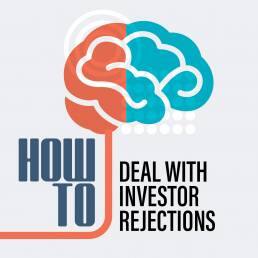



Note to readers: #HowTo – The Tutorial Series is designed to give our readers an edge on matters of competitiveness, upskilling/reskilling and knowledge gathering. Essayed in a lucid, snackable format, the series brings in some of the most relevant voices on a subject, so that you benefit the most in your business or career. In this episode, we examine the phenomenon of investor rejections, the way to deal with them and win. You can read the previous stories in the series here, here, here, here, here, and here.
Investor rejection is a reality that any start-up founder has to endure. Seasoned founders take it on their chin and move on, but it is usually a tough reality-check for newcomers. Many of these newbie founders are toppers in schools and colleges, having rarely experienced ‘failure’. So, when their start-up proposal gets rejected by investors, it’s often a bitter pill to swallow and a shattering blow to their confidence.Eela Dubey, co-founder of EduFund (investment advisory firm that helps parents plan higher education of their children), had to approach more than 65 investors including angels and venture funds before she was able to raise a million dollars. “99% of the investors will turn you down. Out of all the ‘no’ we got, only one investor told me why we got a ‘no’. Your boat gets rocked often, but you keep pushing,” she says.Facing a series of rejections can hit any founder’s self-esteem but how you get back up after the blow often determines how high you soar. Let’s examine how it can be handled well.Don’t take investor rejections personallyThe founder needs to think of the whole process as some sort of a filter. All founders think that their start-up idea is good, but it’s the job of the investors to judge it. Remember that investors will never let a great idea pass, since it’s in their interest to fund a scalable project. It’s possible that they may misjudge an idea though, hence one doesn’t need to take that personally. Maybe they are helping you to think over that plan again, or junk the plan and put together a completely new one from scratch.A few of the founders go ahead with their plans despite a series of investor rejections. One could see that as the founder’s conviction but chances are that there are far too many gaps in the venture. Rejections provide an indicator about the start-up idea’s weaknesses. Taking these rejections in your stride is key to becoming a successful founder and here’s how you can take those hits and keep moving:Take an honest look at why the idea was rejectedAccording to Neeraj Tyagi, founder of investment vehicle WeFounderCircle, investor rejection could be seen as an opportunity to do the right revisions. “Consider investor feedback carefully, rather than viewing it as an outright ‘no’. Founders should take the investors’ rejection as an opportunity to do a deep-dive diagnosis about their business plan,” says Tyagi, one of India’s leading angel investors.
Ask the investors to give you specific advice and use that to make relevant changes whether it is related to your plan or pitch deck. “If the founder is seen to regularly update, even after facing rejections, it can work like magic. It showcases the openness and learning attitude of the founders. Investors appreciate this approach,” says Tyagi.
It takes a minimum of seven meetings with a VC to close an investment deal, says Sanjay Mehta, leading angel investor and founder of 100X.VC. Check the list of VCs pitched to and the number of meetings done. If it crosses seven meetings then mark them as a good qualified VC lead; until then it’s only in a prospecting or discovery mode.
Entrepreneurs need to decode pitch meetings and accordingly prepare for the next one. If there were too many questions around market size, it can be gauged that VCs do not believe that your idea can scale. If in the pitch meeting the talks are stuck on the business model, then the investors do not seem to believe in your unit economics or pricing ability, says Mehta.If the objections are on the go-to-market strategy or customer acquisition, then it may be assessed that the VCs do not believe in your execution plan. If the investor is spending a lot of time on queries around competition, VCs are worried about the founder's ability to raise the next round as there is probably no moat to win against competition, says Mehta. If the investor discussion is glued on founders, the team can then interpret that VCs are finding the team incomplete. If more information is requested on products, the investors do not see your product-market fit readiness. If you see no objections from investors to your assumptions, or questions on your projected numbers, or inputs on your business model, then you are not getting their money, says Mehta. They are not interested.Remember that you need only one ‘Yes’“Sometimes the investors give you a lazy ‘no’. But most often the ‘no’ is data-backed,” says Eela Dubey of Edufund. “Remember that investors are subjectively human too. They have limited time,” she says.That’s why you need a good surf board to ride the wave. You will tumble, hit by the waves. But get back on your board again.Charu Chaturvedi, co-founder of AgriGator, a digital agricultural logistics platform, says that sometimes investors reject you only because they are unable to understand your business model. Investors look for margins, revenue streams, economies of scale, tech/product reach and feasibility. It’s true that you know your idea well but investors have an extensive portfolio and exposure to innumerable business models. “You may end up using just one suggestion and do wonders with it,” she says.But despite all the rejections that you may face, keep reminding yourself that all you need is just one ‘yes’ from an investor. So, keep looking for that elusive ‘yes’. The key is to talk to the right investor for the right phase of the idea. “There are lots of investors who invest varying ticket sizes even at the idea stage or minimum revenue phase,” says Chaturvedi.In many ways, your conviction is all that matters. Have a contingency plan to make sure you have a minimum flow of funds to keep the business running until the investor money hits the company’s account. “Don’t get obsessed with your idea. Be flexible to grow with changes,” she adds.But if your own conviction starts eroding due to a variety of factors, then it may be time to look at another start-up idea.

Discover the latest Business News, Sensex, and Nifty updates. Obtain Personal Finance insights, tax queries, and expert opinions on Moneycontrol or download the Moneycontrol App to stay updated!